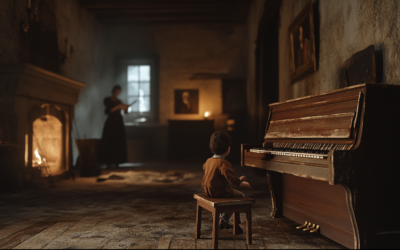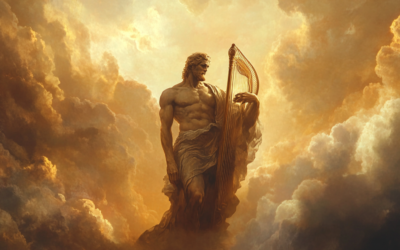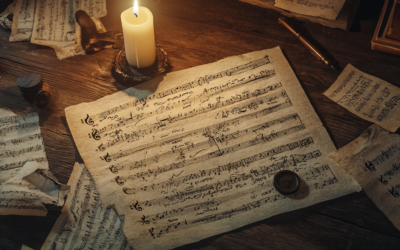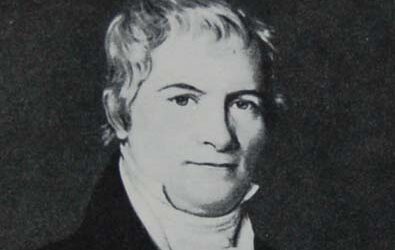The Nationalistic Roots of the Philharmonic
Music in Service of the Third Reich
In 1943, Nazi Propaganda Minister Joseph Goebbels produced Die Philharmoniker, a film designed to glorify the Reich’s national orchestra. Under state ownership since 1933, the Berliner Philharmoniker became an emblem of Nazi Germany, portraying the nation’s “pure” musical heritage.
The orchestra, directed by Wilhelm Furtwängler and others, exclusively performed a curated selection of German composers, avoiding foreign works deemed “mediocre.”
Behind this cultural project lay a deep-seated nationalist agenda, one that reframed history to elevate German composers as the rightful heirs of musical supremacy.
Mozart: The Fall of the Gods
This book compiles the results of our studies on 18th-century music and Mozart, who has been revered for over two centuries as a deity. We dismantle the baseless cult of Mozart and strip away the clichés that falsely present him as a natural genius, revealing the contradictions in conventional biographies. In this work, divided into two parts, we identify and critically analyze several contradictory points in the vast Mozart bibliography. Each of the nearly 2,000 citations is meticulously sourced, allowing readers to verify the findings. This critical biography of Mozart emerges from these premises, addressing the numerous doubts raised by researchers.
"German music is for me sacred; it alone poses and resolves the mysteries of the world."
Mozart: The Fall of the Gods
In the 1943 film Die Philharmoniker, Joseph Goebbels aimed to showcase the Reich’s orchestral prestige. The Berliner Philharmoniker, absorbed by the German state following the Nazi rise in 1933, operated under direct government control. The orchestra’s service was considered civil duty, overseen by the Ministry for Public Enlightenment and Propaganda. This arrangement was not coincidental; it was part of an orchestrated cultural movement designed to depict German music as the superior legacy of a powerful and “purified” nation.
Under Goebbels’ ownership, the Berliner Philharmoniker became a well-oiled propaganda machine. No detail was overlooked, and the orchestra accompanied key Nazi events—from Hitler’s birthday celebrations to the 1936 Olympic Games opening. Music, in this context, was no longer a mere art form; it was the embodiment of an idealized German essence, one thought to unify the nation, fortify morale, and inspire a belief in Germany’s supremacy. Meanwhile, Hermann Göring maintained control of the nation’s state theatres, fostering a similarly narrow focus on “pure” German productions.
Germanic Music and the “Trinity of the Viennese Classics”
Goebbels’ ideal conductor, Wilhelm Furtwängler, upheld a repertoire aligning with the party’s ideology, keeping works by Haydn, Mozart, and Beethoven firmly in the spotlight. These three formed what Nazi musicologists hailed as the “Wiener Klassik” or “Viennese Classicism.” More than 70% of Furtwängler’s performances under the Third Reich centered around these composers, alongside German luminaries such as Brahms, Strauss, and Bruckner. Foreign composers were conspicuously absent, with Hitler’s rhetoric dismissing them as “petty shopkeepers” unworthy of standing before Germany’s grand musical throne.
When asked about the steadfast presence of Mozart and others in his repertoire, the Furtwängler character in Die Philharmoniker replied that his choices were neither those of a “curious wanderer” nor a “scholar with mere academic interests.” Instead, he professed a love for “great works,” explaining that he performed them simply for their inherent beauty, warmth, and inspiration. This was German music’s ordained narrative—a “sacred” heritage of unparalleled profundity.
The Roots of Viennese Classicism
“Viennese Classicism” as a concept predated the Nazi era, but its nationalist overtones were pronounced by the Third Reich. Originally crafted by Austrian nationalist Raphael Georg Kiesewetter in the 19th century, the term had aimed to cement the supremacy of German-Austrian composers, conveniently disregarding classical contributions from French and Italian composers. The label became a tool of cultural defense, a rallying point for those seeking to assert German music’s dominance against the rising popularity of Italian opera and French influences during the early 1800s.
The foundations of this fabricated “classic” period can be traced back to Christian Friedrich Daniel Schubart, who in the late 18th century declared that Haydn’s compositions had “created a new era.” Later, Ernst Theodor Amadeus Hoffmann echoed this sentiment, citing Haydn, Mozart, and Beethoven as pioneers of a “new art” and suggesting that their work represented the pinnacle of musical evolution.
As these sentiments gained traction, composers and critics alike joined the nationalist cause, reinforcing the notion that Haydn, Mozart, and Beethoven were the undisputed founders of a “German school” of music. The fervor peaked with Johann Amadeus Wendt, who claimed that this supposed German period represented “the basis of true musical enjoyment in Germany.” Kiesewetter later reinforced this view, declaring that their “perfection” elevated them as models for all German composers, supposedly inspiring “every field” of music to its greatest heights.
Haydn, Mozart, Beethoven: A Nationalist Trinity
The Nazi narrative immortalized this trinity as the venerated cornerstone of German music, with Bach serving as a revered forebear. Yet this lineage was a product of careful myth-making—a constructed genealogy aimed at sidelining external influences and elevating German music as the ultimate heritage. Kiesewetter’s classification, driven more by national pride than musicological accuracy, omitted the considerable European and Italian influences that shaped these composers.
Conclusion:
The Berliner Philharmoniker, under Nazi control, was not merely an orchestra but a cultural weapon. The fabricated history and curated concert repertoire promoted by Goebbels’ propaganda machine served to reinforce a vision of German musical “purity.” This engineered lineage—anchored in the mythologized legacy of Haydn, Mozart, and Beethoven—supported the Third Reich’s ideology, presenting German music as the supreme, enduring inheritance of a powerful nation. In reality, however, the concept of a “German school” of music had been forged in the fires of nationalism, overlooking the many non-German influences that enriched these celebrated works.
You May Also Like
The Myth of Mozart’s Childhood
Mozart’s childhood is often romanticised, but behind the myth lies a more complex reality. This post explores the hidden dynamics within his family, questioning the traditional narrative of Mozart's early years and shedding light on the forgotten role of his sister,...
Bohemia or Moravia: Reconfiguring Music History
Why does music history insist on an Austrian narrative, when the contributions of other nations are just as crucial?
The True Caregiver: A Closer Look at Mozart’s Final Days
Who truly cared for Mozart in his final days: his wife Constanze or his sister-in-law Sophie? The True Caregiver unravels this age-old mystery, challenging our perceptions and shedding light on the figures closest to the composer in his last hours.
The Mysterious Origins of Mozart’s K.115
The story of Mozart’s Mass K.115 is one of myth and mistaken identity, pointing not to Wolfgang’s genius but rather to his father Leopold’s hidden influence.
Unveiling the Truth: Mozart in Paris
Unveiling the often-overlooked reality of Mozart’s time in Paris reveals a story of manipulation and deception, far removed from the glorified narratives crafted by his father, Leopold.
The Questionable Legacy of Niemetschek’s Biography
Leopold Mozart’s life was a whirlwind of ambition, deceit, and disappointment—a stark portrait of a man chasing success at any cost.







